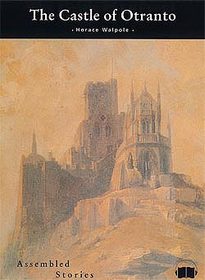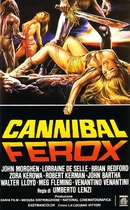Our editor-in-chief Nate Yapp is proud to have contributed to the new book Hidden Horror: A Celebration of 101 Underrated and Overlooked Fright Flicks, edited by Aaron Christensen. Another contributors include Anthony Timpone, B.J. Colangelo, Dave Alexander, Classic-Horror.com's own Robert C. Ring and John W. Bowen. Pick up a copy today from Amazon.com!
Cold Reads: The Castle of Otranto by Horace Walpole
When one makes an outlandish claim such as the chicken came before the egg or that it was Elvis who put the bop in shop-bop-a-loo-bop, one should expect to be met with a torrent of verbal venom and rotten produce. Saying that The Castle of Otranto is the very first horror novel in literature history seems like a claim that would receive a similarly warm reaction. Generally regarded as the first Gothic novel, I believe that by extension this book must have had a good amount of influence on the genre as a whole and helped shape the foundation of horror. While most definitely not perfect, Otranto serves as a nice little history lesson in terror. Like they say, it all had to start somewhere...
Prince Manfred, a rather dastardly and ruthless monarch, is determined on disproving an ancient prophecy that his castle shall bear no sires in his name after he gives up the crown. He does this by throwing together a hasty wedding between his sickly son Conrad and the beautiful Isabella. Alas, the heavens have other plans for Manfred and bring the nuptials to a screaming halt when a gigantic helmet falls from the sky and crushes poor Conrad to death. Wait, there's more! Bereaved at the loss of his son for a whole two minutes, Manfred decides that the show must go on and proposes to marry Isabella himself. Less than thrilled, the damsel escapes the prince's clutches and runs into a handsome peasant named Theodore who ensures her safety in typical heroic fashion. More curses, weird happenings, and MTV-reminiscent drama ensues in the remainder of the book.
All that being said, it must be admitted that The Castle of Otranto is a dull and tedious read. Having been written during the time when novels themselves were just starting to kick in, Walpole does what almost every two-bit writer of the time did as well i.e. telling the story instead of gradually showing it to the reader. Instead of having subtle scenes where the character's motivations or emotions are revealed, Walpole stops in the middle of dialogues and basically says, "At this time, Manfred was feeling this and then he decided to do that." It makes the characters feel more flat than ironed cardboard and they're all basic archetypes to begin with anyway. Manfred was the only character in the book who kept my attention simply for the fact that he was so damn evil and stubborn. Every time he has a chance to redeem himself or make the right choice, he turns about and walks briskly into the dark side, nary a second thought plaguing his mind. He is an unstoppable machine who simply cuts through the other characters like a hot knife through butter in order to get what he wants.
Oh, yes. The other characters. I'm still trying to forget about them. In addition to the valiant Theodore and the strong-willed Isabella, we have to suffer through the likes of Manfred's wife Hippolita, their daughter Matilda, and the good monk Jerome. All I could imagine when straining my eyes through the pages concerning these characters was that Walpole must've sat down with quill in hand and said, "You know, that Manfred guy is way too evil. I better make every single other character overly nice and disgustingly righteous if I'm gonna balance this out." Take Hippolita and Matilda for example. When Hippolita receives the news that her husband has plans to divorce her and take the most likely underage Isabella to bed, she reacts a tad somber at first but then says, "Well, I guess Manfred must know what he's doing. He is The Man after all." It's even worse in Matilda's case. After being stabbed by her own father who mistook her for Isabella (Oh, hush. Like you really cared) the girl reacts like any princess bleeding to death would: "No, no, Father. Restrain your tears. It was my fault that you plunged that dagger into my back! Don't sweat it, daddy-o." Granted, this might have been the way in which society acted during those times, but reading passages like these can't help but elicit a few giggles from the audience. As for Theo and Izzy, I saw them as the Brad and Janet of Otranto. Sadly, there were no transvestites. However, there was an ample amount of occasions where I was itching to shout obscenities at the two lovers.
"Wow," you must be saying. "How did you possibly get through this book?" Don't get me wrong. This story may be a two-dimensional, cheap little Gothic piece of migraine-inducing badness that I much rather use as kindling for the fire than have to endure the displeasure of forcing myself to swallow down again like bad cheese and arsenic... but it has it's good points. The beginning moves along at a brisk enough pace and gets you engaged in the story. Several macabre happenings sprinkled (sparingly, might I add) throughout the book kept my interest: the giant helmet mishap (more snicker than shiver inducing), a weird episode that involves a portrait coming to life and guiding Manfred down a shadowy corridor, and a few occurrences where the hand and foot of an armored giant are spotted throughout the castle (don't ask) liven the damp mood. The book itself seems to be more of a soap opera than a lurid horror novel, but it doesn't get anywhere near the heights in style that were reached by Dark Shadows and the films of Hammer. While there is a little less than a necessary amount of atmosphere and creepy scenes, there is just enough that will ensure your completion of the novel. Or maybe not.
All my joking and sarcastic remarks aside, I went into The Castle of Otranto really wanting to enjoy it. And there were parts that I genuinely did like, but the amount of mundane exposition and asinine dialogue eventually prevailed at the end of the day. Despite this fact, I will always respect the book for being the granddaddy of the horror genre and will take note of its historic value. My advice is to approach this novel with that exact mindset. Don't go in expecting a Dracula or even a Varney the Vampire. Like it for what it has to offer and rag on it for pretty much everything else.









And here I was thinking The
And here I was thinking The Monk was supposed to be the first gothic horror novel. Looks like The Castle of Otranto predates it by about thirty years.
I wish you were right. That
I wish you were right. That way I would've been saved from having to go through this. In all sincerity though, The Monk seems like a really great novel from what I've read on it.
Oddly, on March 8th of this
Oddly, on March 8th of this year, the comic blog site Pappy’s Golden Age Comics featured the 7-page comic book adaptation of this novel printed in 1948. If you’re interested, here is the link:
http://pappysgoldenage.blogspot.com/2010/03/number-697-castle-of-nonsenso-in.html
Paul
Yes, I know that by
Yes, I know that by contemporary standards, Castle of Otranto really isn't very good, but it was the first, and I have infinite respect for Horace Walpole, both for creating the Gothic revival architecture that I love, in his house at Strawberry Hill, and for that weird dream that he wrote down on waking, unwittingly creating the whole wonderful genre of Gothic Horror!
If it wasn't for Horace, I wouldn't now be watching Gothic Horror films, reading beautiful vampiric novels, wearing black velvet and eyeliner and calling myself a Goth, living in a converted Victorian Gothic Revival church, or spending my evenings listening to Japanese Goth Metal music.
And as a gay man in a predominantly straight world, Horace set up the whole vision of Gothic as a joyfully subversive alternative to conventional Classicism.
I feel deeply indebted to Horace Walpole; I have his picture on my wall, and whenever I'm in London, I drop in at the National Portrait Gallery, have a look at his portrait and say hello.
Paul- I can always rely on
Paul- I can always rely on you to dig up these interesting finds! Thanks for this. The comic appears very interesting and the art looks fantastic.
Happy Tentacles- Thanks for sharing your views! I agree that the book is a historic milestone in both the Gothic and horror genres. For that I give it my undivided respect. As dated and banal as it may seem, the book that Walpole penned was truly revolutionary for its time. Awesome to see that you truly celebrate and live in the Gothic fashion. Give my regards to Horace on your next visit.
Jose Cruz